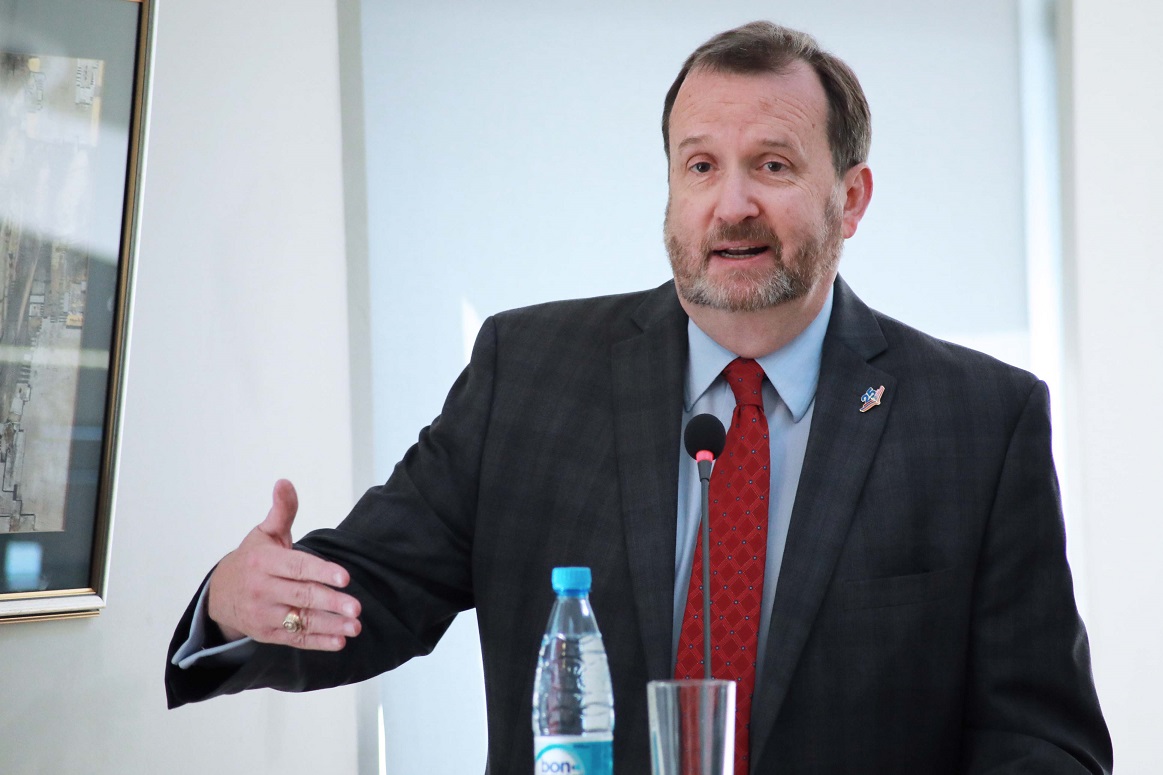The United States Ambassador to Armenia Richard Mills talked about some hot-button issues in the South Caucasus and Caspian regions this week during his interview with EVN Report magazine, including the Armenia-Azerbaijan Nagorno-Karabakh conflict.
“I was surprised when I first got here and found out that most Armenians I met were adamantly opposed to the return of the occupied territories as part of a negotiation settlement,” Mills told EVN on Monday, as he was preparing to leave his post in Yerevan after more than three years.
Mills expressed his hope that the transition period in Armenia, which started off with the change of power in the wake of a Velvet Revolution in May, will lead to discussions on what Armenia’s options are and what Armenia is prepared to accept regarding settling the conflict.
“It has long been my government’s understanding of why the occupied territories were originally seized; they would be land for a peace option. The harsh reality is that any settlement is going to require the return of some portion of the occupied territories,” Mills said, noting that return of occupied lands is one of the core principles of the Madrid Principles – one of the proposed peace settlements to Nagorno-Karabakh conflict.
Ambassador Mills went on to add that Armenia is no longer favoring the status quo due to certain reasons such as closed borders, the strain on the country’s material and human resources, and corruption risks associated with the conflict.
Azerbaijan's Nagorno-Karabakh region was the epicenter of a conflict that emerged in the twilight of the Soviet Union. In the late 1980s, Armenia made claims on the Nagorno-Karabakh region that is internationally recognized as part of Azerbaijan but was partially populated by ethnic Armenians alongside indigenous Azerbaijanis. After two countries went to war in 1991, Armenia seized the entire Nagorno-Karabakh region along with seven adjacent territories, amounting to 20 percent of Azerbaijan’s sovereign territory.
Since the 1990s, Armenia has been ignoring international efforts to remove troops from the region, including four UN Security Council resolutions. Routine ceasefire violations by the Armenian forces along the Line of Contact, which separates the two armies involved in the conflict, keep the region on edge.
The United States, along with Russia and France, try to play a mediation role via the OSCE Minsk Group, which all three co-chair, but to date no settlement plan acceptable to both sides has been founded.
Yet despite international efforts to find a peaceful end to what is a decades-old conflict, Armenia’s Prime Minister Nikol Pashinyan has been showing an ambiguous stance on finding a durable and peaceful resolution to the conflict since his rise to power in a revolution that dethroned Karabakh war veteran Serzh Sargsyan in May.
Pashinyan had a brief conversation with Azerbaijani President Ilham Aliyev on the margins of a meeting of the CIS Council of Heads of States in Dushanbe in September. President Aliyev’s official website indicates that the leaders affirmed their commitments to the process of negotiations and strengthening the ceasefire regime.
But in his address to the United Nations General Assembly in New York earlier that month, Pashinyan took a different tone. There, according to Armenian media, he said that the Nagorno-Karabakh region, “must not be part of Azerbaijan” and called on Baku to start negotiating with what he calls “the Nagorno-Karabakh Republic” referring to the illegal separatist regime in the occupied lands of Azerbaijan.
Earlier, in his visit to Nagorno-Karabakh region on June 16, Pashinyan vowed Yerevan’s “unconditional support to the political course” of the same regime, according to his official website.
The U.S. embassy in Baku said in response to Azerbaijan’s concerns over the visit of the self-proclaimed leader of the illegal separatist regime in Azerbaijan's Nagorno-Karabakh region to the U.S. Congress on March 14 of this year that the recognition of a de facto regime in Nagorno-Karabakh is not considered by Washington.







 Russian Foreign Minister Sergei Lavrov has reasserted that Moscow has no intentions to stop the fighting in Ukraine, even if peace talks commence.
Russian Foreign Minister Sergei Lavrov has reasserted that Moscow has no intentions to stop the fighting in Ukraine, even if peace talks commence.
 Iran has refuted reports of alleged damage to Shimon Peres Negev Nuclear Research Centre located southeast of Dimona, Israel, during the recent air...
Iran has refuted reports of alleged damage to Shimon Peres Negev Nuclear Research Centre located southeast of Dimona, Israel, during the recent air...
 Iran’s Foreign Minister, Hossein Amir-Abdollahian, has labeled a foiled Israeli drone attack in certain parts of the country as a "failure" for Isr...
Iran’s Foreign Minister, Hossein Amir-Abdollahian, has labeled a foiled Israeli drone attack in certain parts of the country as a "failure" for Isr...



